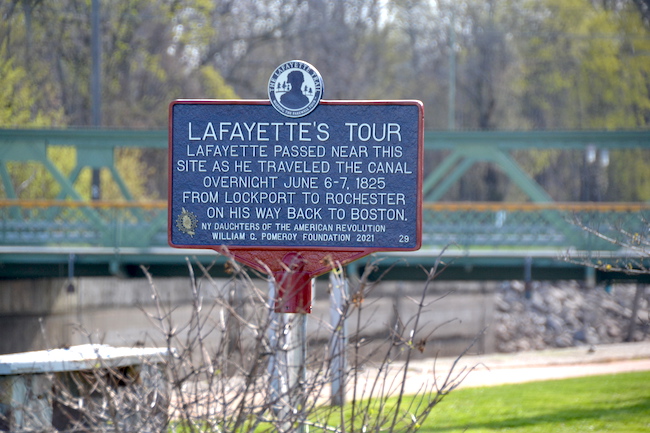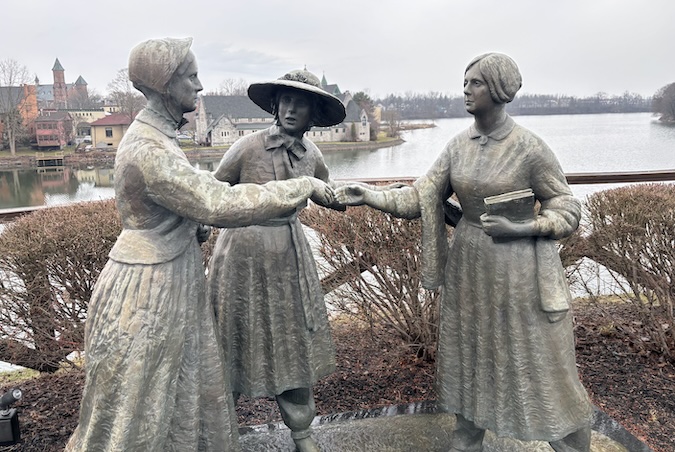Orleans given $15,000 by state to celebrate the country’s 250th anniversary in 2026

Photos by Tom Rivers: This historical marker dedicated for a Revolutionary War hero was unveiled on April 14, 2021. The marker highlights Marquis de Lafayette, a French military officer who provided critical aid to George Washington in securing American independence. The marker notes a farewell tour in 1824-1825 to honor Lafayette, who traveled on the Erie Canal from Lockport to Rochester in June 1825 to great fanfare. This marker is located by the Erie Canal in Albion in between the two lift bridges.
ALBION – The state has given Orleans County $15,000 to help commemorate the 250th anniversary of the American Revolution in 2026.
The New York State 250th Commemorative Commission sent Orleans County Historian Catherine Cooper a letter on Nov. 7, thanking the county for partnering with the state Education Department in commemorating the American Revolution and also the “Unfinished Revolution.”

She has been leading an effort this year for the Orleans County Bicentennial, highlighting important dates, events and citizens since the community’s founding.
None of the Revolutionary battles were fought in Orleans County, but several soldiers from the war settled in Orleans County. Some of those soldiers, who are buried at local cemeteries, will be spotlighted next year, Cooper said.
People interested in being on the committee can reach out to Cooper by email at Catherine.Cooper@orleanscountyny.gov or call her office at (585) 589-4174.
New York State 250th Commemorative Commission wants to do more than celebration the period of American Revolution and the formation of the United States. That Commission wants to recognize ongoing efforts to reach the goals expressed by the nation’s founders. New York has been a significant force in those movements, including such iconic, historic stories as serving as the routes for the Underground Railroad, the abolition of slavery, women’s suffrage, the labor movement, and the LGBTQ+ rights movement, Gov. Kathy Hochul said on May 14 last year when the state named members of the Commemorative Commission.
There are numerous existing sites and battlefields associated with New York’s role in the American Revolution, all of which are vital to telling this part of the history of the nation., the Commemorative Commission writes in a guide to observing the 250th anniversary.
“The Founding Fathers wrote, ‘We hold these truths to be self-evident, that all men are created equal, that they are endowed by their Creator, with certain unalienable Rights, that among these are Life, Liberty, and the pursuit of Happiness,’ as the guiding principles of a new nation,” the Commission states. “New Yorkers continue to lead in efforts to expand these ideals to include everyone. This part of the Revolution continues.”
For more information on the NYS 250th Commemorative Commission, click here to see a field guide on the commemoration.
The state’s commemoration of the 250th anniversary of the American Revolution isn’t just based on the country’s founding in 1776. NYS wants to highlight other significant movements, including the push for women’s rights. This photo shows three statues in Seneca Falls of prominent women’s suffrage leaders.
The statues “When Anthony Met Stanton” depict the chance encounter in May 1851 in Seneca Falls that forever altered the struggle for women’s rights. Amelia Jenks Bloomer, depicted in center, introduced Susan B. Anthony, left, to Elizabeth Cady Stanton.
The friendship that was forged between Stanton and Anthony gave direction and momentum to the 72-year struggle for women’s suffrage which was culminated on Aug. 26, 1920 with the passage of the 19th Amendment in the U.S. Constitution. Neither woman lived to see women’s suffrage become a reality. When Anthony Met Stanton was gifted to the Seneca Falls community by the Governor’s Commission Honoring the Achievements of Women on July 18, 1998.
























































